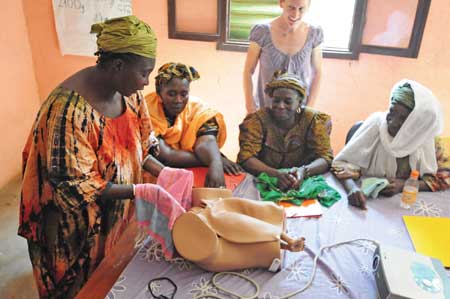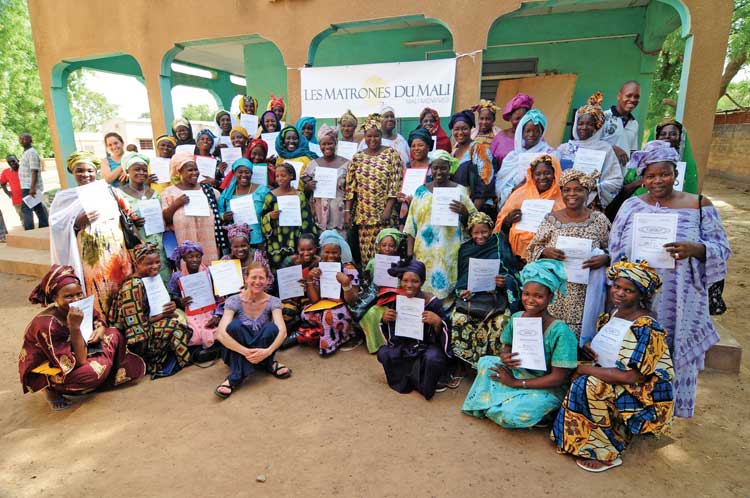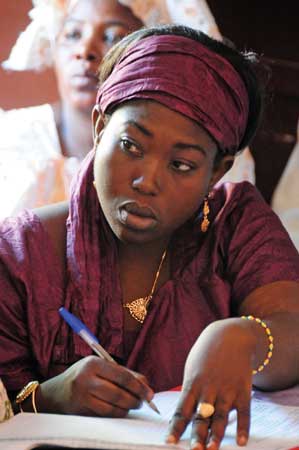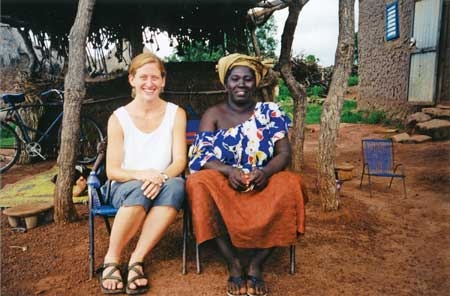By Nicole Warren ’98, PhD, MPH, CNM
Fifteen years after Peace Corps, Nicole Warren ’98 remains committed to Mali’s matrones

I was sworn in as a Peace Corps volunteer in May 1994, after three months of crash courses in local language and maternal and child health, and deposited rather unceremoniously in a village about eight miles off a paved road in southeast Mali, West Africa. By default, I began working with Sali, a matrone, or auxiliary midwife. She was the only female health care worker available in her community.
When I met her, Sali could not believe I had never seen a child born. Hadn’t everyone? She laughed, shaking her head in amazement as she put my inexperience with birth in the same category as not being able to pound millet or carry water on my head. Despite our vast differences, Sali took it upon herself to introduce me to working with childbearing women.
In Mali, matrones are formally trained health care workers, providing the majority of reproductive health services in a country where one in 15 women die from a childbearing related cause. Though they are uniquely situated to help reduce maternal mortality in their communities, matrones fall at the bottom of the medical hierarchy. Because of their rural location and relatively low status, most matrones are inadequately trained, poorly supervised, lack basic equipment, and receive little continuing education.
Despite these challenges, matrones are committed, determined health care workers who provide the best care they can with little respite or support. It was Sali who introduced me to the realities these women face as wife, mother, farmer, and matrone. Sali’s family and clients needed her attention at all hours. Clients came to her on the backs of bikes, mopeds, and donkey carts. She never turned them away. She couldn’t have if she wanted t They literally trailed her as she made the well-worn trip from her home to the village maternity throughout the day.

On market days when I helped her with prenatal consultations, Sali’s multitasking was at its peak. I remember watching her assess one client’s abdomen, explain how to take an antibiotic to another confused client, and breastfeed the youngest of her eight children—all at once. When the last client was taken care of, Sali would sigh and complain that her busy morning prevented her from getting the best produce at the market.
I returned to the U.S. in 1996 and pursued training in nursing, midwifery, and public health, traveling to Mali as often as I could. In 2002, I became a nurse-midwife and began to appreciate the magnitude of the matrones’ responsibilities through my own professional lens.
As I struggled to balance my own personal and professional responsibilities, I thought about the matrones, who were doing the same thing, only under much harsher conditions and with far fewer resources. In the midst of my busy clinic day, I could call up an electronic version of evidence-based guidelines to help guide my practice. A well-rested, competent colleague would reliably relieve me at the end of a 24-hour shift. If a client I had been laboring with suddenly developed a complication, I could call on a nearby expert to provide needed care. Matrones have no such resources.
I was fascinated by the matrones’ experiences and admired the way they managed with so few resources—and so the matrones became the focus of my doctoral research. I traveled to Mali in 2003-2004 to conduct my field work, interviewing matrones in the district of Koutiala, where I had served as a volunteer.
The matrones were natural collaborators, eager to tell their stories and proud of the contributions they make to their communities. They described the way they link traditional and biomedical models of care and provide access to higher levels of care when needed. Many expressed frustration that they could not do their job as well as they would like, struggling to meet their responsibilities with few supplies, little supervision, and little continuing education. In a place like Mali, where the health care system is severely under-resourced, I knew that these front-line matrones would struggle to find that support.

Back at home, the matrones’ stories stayed with me. They had told me about women bleeding to death because they did not have the drugs they need. They grew tired of delivering stillborns caused by malaria. Like so much of maternal and newborn mortality, most of these tragedies were preventable.
So, in 2006, I formed an organization called “Mali Midwives” to support continuing education for matrones.
With enormous support from other returned Peace Corps volunteers, U.S.-based nurse midwives, family, and friends, Mali Midwives raised enough funds by 2009 to sponsor a pilot project: a continuing education event for matrones in Koutiala.
The medical director and the midwifery supervisor I had known in Koutiala in 2004 had both been replaced in the intervening years, so the first Mali Midwives event was organized with nothing more than a few phone conversations and a couple of awkward e-mails. The day before the event, three of the region’s top clinical staff—two sage-femmes, the most highly trained midwives in Mali, and a physician specializing in reproductive health—sat down to adapt the training materials to fit the matrone’s education, skill level, and preferred language (Bambara, not French).
The matrones were scheduled to arrive the next morning. I woke up feeling anxious and hurried down to the medical center, trying to keep my expectations low. But as I turned the corner to the health center’s courtyard, I was greeted by dozens of matrones chatting with old colleagues and friends. Sali flashed her broad smile at me from the back of the crowd. I had not seen her in four years.

Over the next six days, 82 matrones participated in the continuing education event, focusing on “essential newborn care.” At the end of each session, matrones were initially hesitant to ask questions. The first few shy inquiries gave way to a barrage of questions well beyond the session materials. They did their best to take advantage of having three supervisors at their disposal.
One matrone asked, “If I hear heart tones at the first prenatal visit but not at the second, what should I do?” Another asked, “How many pills of iron should the woman take?” A third tried to clarify when and how much malaria prophylaxis should be given. These discussions had the others on the edge of their seats. The matrones had been waiting for an opportunity to ask these questions, to have an audience with more highly skilled colleagues, and to discuss common problems with peers. When the matrones were satisfied, the session broke up and matrones lingered, exchanging stories and ideas about caring for women and newborns.
This was by far the shortest trip I have ever taken to Mali—barely two weeks. But as I said goodbye to Sali and watched her start her journey back to the village where we had first met 15 years earlier, I felt like I had come full circle.
In September, Nicole Warren will again come full circle, returning to Hopkins (where she earned her baccalaureate nursing degree in 1998) as Assistant Professor in the Department of Community Public Health. Warren is Director of Mali Midwives, a non-profit organization dedicated to helping auxiliary midwives in Mali get continuing education. To lend your support, visit www.malimidwives.org, become a fan of the Mali Midwives Facebook page, or contact Dr. Warren at [email protected].